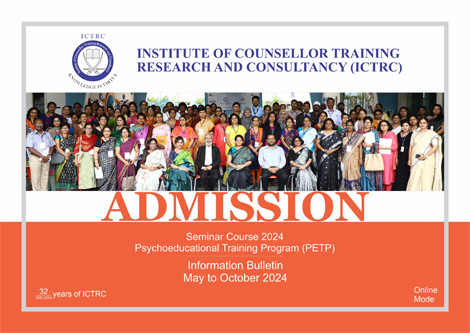Intervention
What was considered as conventional wisdom in days past is lost to a large extent today. Individuals today find themselves alone and are bewildered when faced with the problems that befall them. In addition to personal problems, educators are responsible for guiding their students as well. This Course is designed to impart necessary knowledge and understanding in the area of psychoeducation, in an effort to equip educators to guide students and parents professionally. A seminar course comprises 3 Psychoeducational Training Programs.
Eligibility
Any one of the following:
In-service teachers possessing graduation with teaching degree/diploma.
In-service teachers with a minimum of two years of teaching experience.
Teachers not presently employed but possessing graduation with teaching degree/diploma.
Administered By
Department of Continuing Education (DCE) – ICTRC
Duration
Minimum Three Months
Mode
Online
Medium
English
Salient Features
Utilizing Blended Learning Approach
Concept of Academic Mentors
Facilitating Role Change of Teachers
Focus on Personal and Professional Growth
Important dates
Online Application Starts
April 4, 2024
Last Date for Submitting Online Application
May 3, 2024
Instructor-led Online Classes
May to October 2024
Viva Voce
Last week of every month
Timings for the Instructor-led Online Classes
5 pm to 7 pm (For all the classes)
Schedule for Instructor-led Online Classes
Program Content
- Motivation – Skill or Trait
- Motivation, Cognition and Emotion in School Achievement
- Low Self-Esteem and other Emotional Problems
- Risk of Rewards
- Social Cognitive Approach to Motivation
- Promoting Independent Learning
Program Content
- Who are Students At-Risk?
- Social, Academic and Psychological Needs of Students At-Risk
- High Risk Environment
- Passive Withdrawal and Active Isolation
- Developing Academic and Behavior Support Program
- Cooperative Learning and Positive Interdependence (CLPI)
Program Content
- Can Children be Depressed – Myths and Misconceptions
- Masked Depression and Children
- Childhood Depression and High Risk Behaviors
- Childhood Depression – Causes and Consequences
- Physical, Cognitive and Behavioral Signs of Depression
- Can we nip Depression in the bud – Early Intervention Strategies
Program Content
- Discriminating between Aggression and Violence
- Suicide and Psychopathy – Facets of Aggression
- Psychosocial Determinants of Aggression
- Emotional Illiteracy in Children
- ‘Moral Reasoning Training’ and ‘Social Perception Training’
- Building a ‘Pro Social Support Group’
Program Content
- Address power dynamics in student-teacher relationships
- Emotional Intelligence and Connection
- Fostering inclusivity and celebrating diversity within the classroom.
- Utilizing Effective Communication Strategies
- Maintaining Ethical Boundaries and Professionalism
- Promoting Student Agency and Empowerment
Program Content
- Understanding Discipline
- Extent, Trends and Patterns of Discipline Problems in Schools
- Cognitive and Neurological Conditions
- Mismatch between learner and learning systems
- Impact of Negative Consequences and Restrictive Practices
- Building Reciprocal Trust and Caring Relationships
Fee
INR 4,250 (All Inclusive for One Seminar Course – 3 PETP) for candidates residing in India.
USD 85 (All Inclusive for 3 PETP) for candidates residing outside the Indian territory.
May Intake 2024
Services
